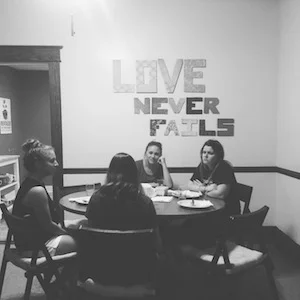 I listen for what I can affirm. I presume that people have treasured enthusiasms that are worthy of affirmation in some small way, and I try to find out what is it about the football game or even the legislation that seems to address a hope or a fear in that person. I start there and see where we can go. I do that in the classroom all the time, when I say something that leads a student to conclude that I’m not on their side. I try to provoke. I think everything I say I really believe, but I do try and direct it in such a way that it invites a sometimes passionate response, or at least that makes the person feel they must respond in order to be true to who they are. And once they do that, that’s not the end of the conversation. That’s the beginning of more questions.
I listen for what I can affirm. I presume that people have treasured enthusiasms that are worthy of affirmation in some small way, and I try to find out what is it about the football game or even the legislation that seems to address a hope or a fear in that person. I start there and see where we can go. I do that in the classroom all the time, when I say something that leads a student to conclude that I’m not on their side. I try to provoke. I think everything I say I really believe, but I do try and direct it in such a way that it invites a sometimes passionate response, or at least that makes the person feel they must respond in order to be true to who they are. And once they do that, that’s not the end of the conversation. That’s the beginning of more questions.
All in Hospitality
 I pray that when the stakes are higher than a baby swing, she will be surrounded by friends who are eager to help. Friends who will sit with her through the mundane, who will help pull her out of her darkest struggle, and who will chase the beauty in the world and make sure she doesn’t miss it.
I pray that when the stakes are higher than a baby swing, she will be surrounded by friends who are eager to help. Friends who will sit with her through the mundane, who will help pull her out of her darkest struggle, and who will chase the beauty in the world and make sure she doesn’t miss it.
 As spring approaches in Cambridge, I’m switching over to (another) new workplace. My daily routine is shifting again, as the afternoon light grows stronger and the tulips poke up through the ground. But as I adjust to my new rhythm, I know I’ll be continuing my daily trips to Darwin’s. Because it’s delicious and homey and comforting. Because my blood, on some days, is about 20 percent spicy chai. Because I’m a regular. Recognized, welcomed, known. And it feels good.
As spring approaches in Cambridge, I’m switching over to (another) new workplace. My daily routine is shifting again, as the afternoon light grows stronger and the tulips poke up through the ground. But as I adjust to my new rhythm, I know I’ll be continuing my daily trips to Darwin’s. Because it’s delicious and homey and comforting. Because my blood, on some days, is about 20 percent spicy chai. Because I’m a regular. Recognized, welcomed, known. And it feels good.
 To assess the secrets we now possessed, my sister and I dismantled every carefully hoarded collection of Cool Whip containers, Styrofoam meat dishes, “brand new” household appliances, and unworn lace. The things no one could use alongside the things someone might want to use. And then there were the things only she loved, the things that told her who she was and what kind of life she had cherished. Things that tell the story of who she thought she was.
To assess the secrets we now possessed, my sister and I dismantled every carefully hoarded collection of Cool Whip containers, Styrofoam meat dishes, “brand new” household appliances, and unworn lace. The things no one could use alongside the things someone might want to use. And then there were the things only she loved, the things that told her who she was and what kind of life she had cherished. Things that tell the story of who she thought she was.
 To take tea is to receive something; it is a gift of mindfulness, gentleness and grace. To partake in company is to merge with a great tradition of civilized communion, which has its version in nearly every culture on earth. Whether it’s matcha sipped reverently in a Japanese teahouse, smoky “Russian Caravan” steeped in a Moscow samovar, or mint tea poured from a standing position with a distinctly Moroccan flair, the allure of ritual remains. There’s something so affirming about connecting with the way things have always been done—or, at least the way they’ve been done for a long, long time.
To take tea is to receive something; it is a gift of mindfulness, gentleness and grace. To partake in company is to merge with a great tradition of civilized communion, which has its version in nearly every culture on earth. Whether it’s matcha sipped reverently in a Japanese teahouse, smoky “Russian Caravan” steeped in a Moscow samovar, or mint tea poured from a standing position with a distinctly Moroccan flair, the allure of ritual remains. There’s something so affirming about connecting with the way things have always been done—or, at least the way they’ve been done for a long, long time.
 I’m told I’m a good hostess. Plenty of interesting food—down-home victuals perked up by saucy suggestions found in vintage recipe books. I get people talking. I listen for laughter and bring out more food, and by the time the last mug is laid to rest on the coffee table, I’m exhausted. I go to bed saying it was so much work I’m never going to host another dinner. But in the morning I awake smiling, knowing a good time was had by all who came expecting one. Like my mother, I enjoy having entertained, enjoy having offered my home-cooked sustenance.
I’m told I’m a good hostess. Plenty of interesting food—down-home victuals perked up by saucy suggestions found in vintage recipe books. I get people talking. I listen for laughter and bring out more food, and by the time the last mug is laid to rest on the coffee table, I’m exhausted. I go to bed saying it was so much work I’m never going to host another dinner. But in the morning I awake smiling, knowing a good time was had by all who came expecting one. Like my mother, I enjoy having entertained, enjoy having offered my home-cooked sustenance.
Maybe I’m like my mom in yet another way. Mom’s mind-set in me may explain why I continue to pursue creative writing when it’s one of the most strenuous mental workouts I can imagine.
 It isn’t normal for a drummer to call an artist and say, “I’m going to play on your next album, and we are going to do it like this.” He and Matt Pierson (the gift of studio time was for the two of them) were very gentle and careful the way they went about it, and so I was able to get into a different place. What would I write if I wasn’t thinking about audience and due dates? I really wanted to lean into being a songwriter, taking the craft seriously. I wanted to write from a more intuitive place. Writing is never easy for me, but it did help to have this wide-open invitation to write whatever I wanted.
It isn’t normal for a drummer to call an artist and say, “I’m going to play on your next album, and we are going to do it like this.” He and Matt Pierson (the gift of studio time was for the two of them) were very gentle and careful the way they went about it, and so I was able to get into a different place. What would I write if I wasn’t thinking about audience and due dates? I really wanted to lean into being a songwriter, taking the craft seriously. I wanted to write from a more intuitive place. Writing is never easy for me, but it did help to have this wide-open invitation to write whatever I wanted.
 My first baby was an Advent baby. Born just a few days after the Church calendar turned over in late November, she arrived in the thick of Christ’s own birth season. As such, her birthday (and mine too, in a sense) now serves as a preface to all of my Advent meditations, forever changing the way I come into Christmas each year. It invites me to remember the vivid physicality of her birth — its pure wonder and raw intensity — and to ponder the Christmas story in light of it. Particularly the role of Mary, who was singly invited and appointed to aid in bringing deliverance to mankind through her own very natural delivery.
My first baby was an Advent baby. Born just a few days after the Church calendar turned over in late November, she arrived in the thick of Christ’s own birth season. As such, her birthday (and mine too, in a sense) now serves as a preface to all of my Advent meditations, forever changing the way I come into Christmas each year. It invites me to remember the vivid physicality of her birth — its pure wonder and raw intensity — and to ponder the Christmas story in light of it. Particularly the role of Mary, who was singly invited and appointed to aid in bringing deliverance to mankind through her own very natural delivery.
Advent: Calling the Dreamers and Realists, Prophets and Pragmatists
Advent is the time when longing and unmet desires meet celebration and fulfillment, holding the two ends of the spectrum of our human experience in tension without denying either of them. Grief and hope, pain and joy together. Because honestly, how often are we not feeling both simultaneously in some way?
 Where was the mystery I’d felt as a child, the anticipation and excitement? The flicker of hope in the candlelight of our Christmas Eve vigil? In the midst of stockpiling my childhood traditions of Christmas joy and imposing them on the life of my new immediate family, I seemed to have signed up for more than my spirit could handle.
Where was the mystery I’d felt as a child, the anticipation and excitement? The flicker of hope in the candlelight of our Christmas Eve vigil? In the midst of stockpiling my childhood traditions of Christmas joy and imposing them on the life of my new immediate family, I seemed to have signed up for more than my spirit could handle.
And then Peter began collecting little things.
 It’s not only that God shines out from orange slices and bookshelves. It’s that with grace, these things make love and goodness. These things—caring for these things, building and cleaning and keeping these things—make a place for the heart to rest and be cared for.
It’s not only that God shines out from orange slices and bookshelves. It’s that with grace, these things make love and goodness. These things—caring for these things, building and cleaning and keeping these things—make a place for the heart to rest and be cared for.
 Language distinguishes us, but it’s still just empty space. Space I can see but not touch, and that’s not enough. I need to hold onto a meaning with texture, with a sharpness that cuts into my hands, gets in my blood.
Language distinguishes us, but it’s still just empty space. Space I can see but not touch, and that’s not enough. I need to hold onto a meaning with texture, with a sharpness that cuts into my hands, gets in my blood.
If this is so important, why don’t I understand it, why isn’t it obvious?
 Fidelity is not a cheap word, and it is not an easy word. Its hunger to consume every morsel of life grudgingly offered it — to yield abundance in return — is insatiable. There is no doubt that fidelity includes our sexual habits and behavior, but at the same time it becomes lost if we confine it only to sexual behavior. Fidelity invites us to better understand our relationship to everyone and everything, to enjoy the blessings of rootedness instead of enduring disorientation, and ultimately allows us a better perch for seeing and engaging reality.
Fidelity is not a cheap word, and it is not an easy word. Its hunger to consume every morsel of life grudgingly offered it — to yield abundance in return — is insatiable. There is no doubt that fidelity includes our sexual habits and behavior, but at the same time it becomes lost if we confine it only to sexual behavior. Fidelity invites us to better understand our relationship to everyone and everything, to enjoy the blessings of rootedness instead of enduring disorientation, and ultimately allows us a better perch for seeing and engaging reality.
 One cold and sleepless night I was suddenly overtaken by a thought that gave me such a panic that I immediately got up, wrapped myself in a quilt, and went to the kitchen to make myself a cup of tea. What if this was it? What if my mother never came back to us? What if all the stories I had heard my entire life went with her?
One cold and sleepless night I was suddenly overtaken by a thought that gave me such a panic that I immediately got up, wrapped myself in a quilt, and went to the kitchen to make myself a cup of tea. What if this was it? What if my mother never came back to us? What if all the stories I had heard my entire life went with her?
 For two women who had plenty to be angry about, nothing was more cathartic than jumping up and down over a ninety-yard punt return. For a woman filled with rage over the slow disintegration of her husband, screaming at the ref for missing another obvious face mask was therapeutic. There had to be justice and fair play somewhere. Couldn’t it at least be found on the gridiron if nowhere else in our lives?
For two women who had plenty to be angry about, nothing was more cathartic than jumping up and down over a ninety-yard punt return. For a woman filled with rage over the slow disintegration of her husband, screaming at the ref for missing another obvious face mask was therapeutic. There had to be justice and fair play somewhere. Couldn’t it at least be found on the gridiron if nowhere else in our lives?
 As I settled in across from the stranger who’d welcomed me, we started exchanging pleasantries and cursory details about our lives. I was an editor for a non-profit, he a jazz pianist whose influence I only learned of recently. And then he asked how my day was.
As I settled in across from the stranger who’d welcomed me, we started exchanging pleasantries and cursory details about our lives. I was an editor for a non-profit, he a jazz pianist whose influence I only learned of recently. And then he asked how my day was.
 Veroli is just a name on a piece of paper in my mother’s handwriting — part of my grandmother’s history that my mother had written down before my grandmother passed away. Out of pages of stories, there are only a few lines mentioning Veroli.
Veroli is just a name on a piece of paper in my mother’s handwriting — part of my grandmother’s history that my mother had written down before my grandmother passed away. Out of pages of stories, there are only a few lines mentioning Veroli.
“Kind nuns took me in.”
“A town in the hills near Rome.”
“So peaceful.”
Love Never Fails
We’re giving ourselves to these things, piece by very tiny piece. But before and amid all of that we’re giving ourselves to God and to each other. We’re relearning that we belong to each other already, that all things and people are connected. We’re creating space where we can remember who we are and whose we are — where we know we’re not alone.
In the Name of the Father
I did not know then nor do I know now the full nature of God. No one does, but we’re given glimpses through the revelation of nature, the testament of history and its saints, and especially through the ordinary people who love us and mark our days. As a child my earthly father represented whatever goodness, safety, and unconditional love there was to be found in this world. And that has everything to do with why I call myself a Christian today, and can still refer to God as Father, problematic though it may be for me as a 21st-century woman.
Keeping the Feast
It was a world — a life — that disappeared with divorce and vows gone wrong, as the garden did under the parking lot. With it went the abundant veggies and flowers, the girlfriends' nights of canning and freezing the harvest, a certain style of gathering friends and family around the walnut table.
All the more richly strange that anyone should gather — in both the old way and the new — at the walnut table nicked now with thirty years of feasting which, though it has changed styles, continues. A table hosting faith and doubt, pain and joy, betrayal and commitment.


















